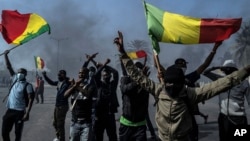The United States is concerned over the political turmoil in Senegal.
On February 3, Senengal’s President Macky Sall announced he was postponing the upcoming presidential election scheduled for February 25 so allegations of electoral irregularities and corruption by the constitutional court could be investigated. He reiterated that he himself will not run for a third term. Two days later, the country’s National Assembly voted to delay the ballot until December 15. That vote means President Sall would remain in power months after his term ends on April 2.
Protests broke out in the capital after the delay was announced. Police dispersed the protesters and opposition supporters with tear gas and there are reports of arrests and intimidation.
The vote to delay the presidential election followed the release by the country’s constitutional council of a final list of electoral candidates that excluded top opposition candidates. In addition, access to the internet and news broadcasts were restricted prior to the vote by the legislature. International rights organizations have warned of a sharp decline in Senegal’s civic freedom in recent months.
The political turmoil in Senegal threatens to dim the light of democracy in one of Africa’s most stable, prosperous, and democratic countries. In a region that has seen neighboring countries rent by civil war and military coups, Senegal, as the State Department noted in its most recent Integrated Country Strategy report, has been “a democratic model with a history of peaceful transitions of power, free and fair elections, and accountable civilian government since its independence in 1960.”
State Department Principal Deputy Spokesperson Vedant Patel said the United States is “closely monitoring” the situation in Senegal and is “deeply concerned”:
“Senegal has a strong tradition of democracy and peaceful transitions of power. And while we acknowledge allegations of irregularities, we are concerned about the disruption of the presidential election calendar, and we urge all participants in Senegal’s political process to engage in – peacefully, to engage peacefully in the important effort to hold free, fair, and timely elections.”
State Department Spokesperson Matthew Miller called on the Senegalese government “to restore full Internet access immediately and to ensure that freedoms of peaceful assembly and expression, including for members of the press, are fully respected. The United States,” he declared, “will remain engaged with all parties and regional partners in the days ahead.”
The political turmoil in Senegal threatens to dim the light of democracy in one of Africa’s most stable, prosperous, and democratic countries.






